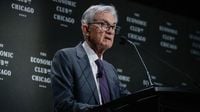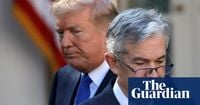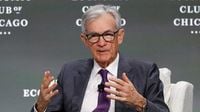On Thursday, April 17, 2025, President Donald Trump escalated his ongoing criticism of Federal Reserve Chair Jerome Powell, calling for his "termination" due to what Trump perceives as a failure to cut interest rates swiftly enough. This latest attack follows Powell's stark warning just a day earlier regarding the economic ramifications of Trump's sweeping tariffs.
In a post on his Truth Social platform, Trump expressed frustration that the U.S. central bank is lagging behind its European counterpart, which had announced it would be cutting interest rates for the seventh time in the past year. "Jerome Powell of the Fed, who is always TOO LATE AND WRONG, yesterday issued a report which was another, and typical, complete 'mess!'" Trump wrote. "Powell's termination cannot come fast enough!"
Powell's comments on April 16 highlighted the potential dangers posed by Trump's tariffs, which he described as "significantly larger than anticipated." He warned that these tariffs could lead to increased inflation and unemployment, presenting a daunting challenge for the Federal Reserve. Powell noted that the Fed is currently navigating uncharted waters, suggesting that the economic landscape is more complex than it has been in decades.
As the European Central Bank (ECB) moved to cut interest rates, Trump pointed to this action as evidence of Powell's inadequacies. "The ECB is expected to cut interest rates for the 7th time, and yet, 'Too Late' Jerome Powell... should have lowered Interest Rates, like the ECB, long ago, but he should certainly lower them now," Trump stated.
Powell, who was first appointed by Trump in 2018 and reappointed by President Joe Biden in 2021, has faced consistent criticism from the former president. Trump's grievances date back to 2018 when he labeled Powell as "the enemy" for raising interest rates amid concerns over inflation. In March 2020, during the early days of the pandemic, Trump claimed he had the "right to remove (Powell) as chairman" after the markets plummeted, although he later praised Powell for slashing rates to prevent an economic collapse.
Despite Trump's calls for action, Powell has emphasized the independence of the Federal Reserve. He has repeatedly stated that removing a Fed chair is "not permitted under the law" and has assured the public that he intends to serve out his term, which ends in May 2026. This independence is crucial, as the Fed's decisions are made based on economic analysis rather than political pressure.
Furthermore, Trump's ongoing criticism raises questions about the future of the Fed's independence, especially as the Supreme Court is expected to revisit a case that could significantly alter the power dynamics between the presidency and independent agencies. The 1935 case, Humphrey's Executor v. United States, established that the president does not have unlimited power to remove agency heads, a precedent Trump has challenged.
In recent weeks, the Fed has held interest rates steady at 4.25% to 4.5%, despite mounting pressure from Trump and other critics who argue that lower rates are essential for economic growth. Powell has indicated that the Fed is prepared to act if the economy shows signs of recession, but he has also warned that Trump's tariffs could exacerbate inflation, complicating the Fed's decision-making process.
As the situation unfolds, many analysts are watching closely to see how Trump's trade policies and the Fed's monetary policy will interact. The World Trade Organization has warned that Trump's tariffs could reverse international trade growth, further complicating the economic landscape.
In light of these developments, Wall Street experts are expressing concerns about a potential recession, with some billionaires suggesting that the U.S. economy may already be on the brink. Ray Dalio, one prominent investor, has pointed out that the uncertainty surrounding Trump's tariffs and the Fed's response could lead to significant economic challenges.
In summary, Trump's latest tirade against Powell underscores the ongoing tension between the White House and the Federal Reserve. As the Fed grapples with the implications of Trump's tariffs and the broader economic environment, the question of Powell's future remains uncertain. Will Trump succeed in his calls for Powell's ouster, or will the Fed maintain its independence in the face of political pressure? Only time will tell.







